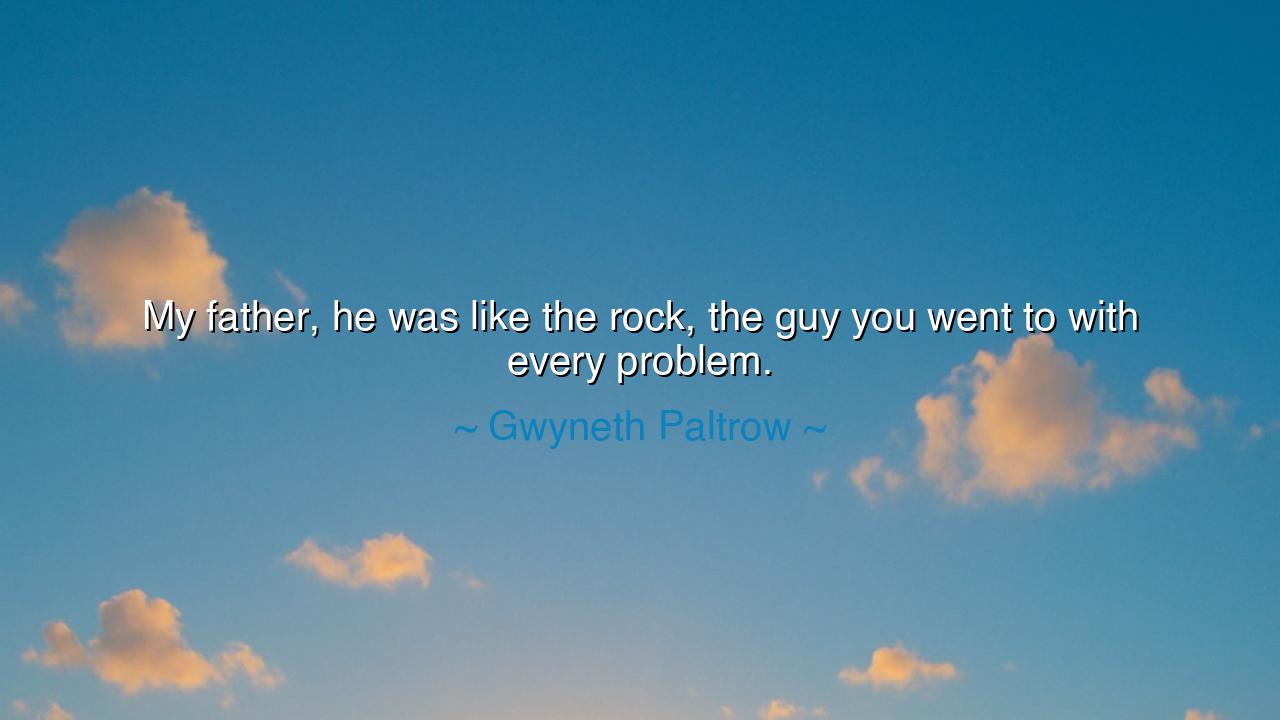
My father, he was like the rock, the guy you went to with every






The words of Gwyneth Paltrow, “My father, he was like the rock, the guy you went to with every problem,” speak not only of love but of legacy—of the steadfast figure who stands unmoved amidst the tempests of life. To call one’s father a rock is not a mere metaphor; it is a declaration of reverence, of gratitude, and of memory. The rock does not dazzle, nor does it seek glory—it endures. It bears the storms in silence, shielding others from their full force. So too does the father who listens, who steadies the trembling hearts of those he loves. In this phrase, Paltrow gives voice to a truth older than civilization itself: that the father’s strength, when tempered by kindness, becomes the foundation upon which all peace in the home is built.
From the dawn of time, the father figure has been seen as the guardian—the one who bears the burden so others might walk in light. Ancient storytellers sang of such men: the shepherd who faced the wolf to protect his flock, the leader who walked last through the desert so his people might find water first. The father’s greatness lies not in his power, but in his constancy. He may not always speak, but his presence is a language all its own—a quiet promise that says, “You are safe.” The rock does not move, yet it allows others to climb higher. It does not shine, yet it provides the footing upon which others can rise.
Consider the tale of Atticus Finch, the father in To Kill a Mockingbird—a man of integrity and patience, who guided his children through the tangled vines of prejudice and fear. When the world around him was filled with hatred, he stood firm, never shouting, never yielding, yet always speaking truth. To his daughter Scout, he was exactly what Gwyneth Paltrow described—a rock, the one to whom she could turn when confusion clouded her heart. Atticus taught not through sermons, but through example: to face injustice without bitterness, to walk with courage even when alone. Such is the nature of true fatherhood—it anchors the soul and teaches by living, not by command.
When Paltrow speaks of her father as “the guy you went to with every problem,” we hear the universal longing for guidance—the human instinct to seek wisdom from one who has seen more, endured more, and still stands strong. The child comes with trembling hands, uncertain of life’s weight, and the father, though weary himself, steadies those hands. His strength is not always loud; sometimes it is a sigh, a touch on the shoulder, a few words spoken when the heart is ready to hear. This unseen heroism is what shapes the next generation. For every calm father, there is a child who learns to face the world with peace.
Yet not every man is born knowing how to be that rock. Some learn it through pain, through loss, through the very failures that harden the heart into something enduring. A father’s strength is often carved by time—each scar a lesson, each hardship a gift to his children. Those who grow up without such a presence often find themselves seeking it in others: in mentors, in friends, in the memory of men who embodied stability. For even when absent, the idea of the father—the symbol of unwavering support—remains one of the deepest archetypes in the human spirit.
From this truth, let every man and woman draw a lesson. To the fathers, be as the rock—strong, but not unyielding; firm, but full of compassion. To the sons and daughters, honor the one who carried your burdens when you were too young to know they existed. Do not forget his quiet labor, the nights he stayed awake while you slept, the dreams he set aside so yours might live. And if your father has departed, remember that his strength still moves within you, like roots beneath the soil that feed the living tree above.
In the end, the rock is not only a person—it is a spirit. It is the embodiment of steadfast love, of patience that endures all storms. It teaches us that true power lies in stillness, not domination; in presence, not perfection. Gwyneth Paltrow’s words remind us that the greatest inheritance is not wealth or fame, but the quiet strength of a father who was always there. Such men do not simply raise children—they raise souls.
So, dear listener, let this be your charge: become the rock for someone in need. Stand firm when others waver. Offer calm when the world trembles. And when the generations after you look back, let them say, as Paltrow did, with gratitude and awe, “He was the one I could always go to. He was my rock.”






AAdministratorAdministrator
Welcome, honored guests. Please leave a comment, we will respond soon